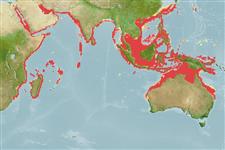Common names from other countries
>
Callionymiformes (Dragonets) >
Callionymidae (Dragonets)
Etymology: Callionymus: Greek, kallion, comparative of kallos = beautiful + Greek, onyma = name; with a better name .
More on author: Valenciennes.
Environment: milieu / climate zone / depth range / distribution range
Ökologie
seewasser demersal; tiefenbereich 2 - 350 m (Ref. 58488), usually 5 - 100 m (Ref. 89972). Subtropical; 30°N - 27°S, 32°E - 169°E
Indo-West Pacific: Red Sea south to Delagoa Bay, Mozambique and eastward to Taiwan. Migrated to the Mediterranean Sea via the Suez Canal (Ref. 5385).
Size / Gewicht / Alter
Maturity: Lm ? range ? - ? cm
Max length : 20.0 cm TL Männchen/unbestimmt; (Ref. 4405)
Rückenflossenstacheln (insgesamt) : 4; Rückenflossenweichstrahlen (insgesamt) : 9; Afterflossenstacheln: 0; Afterflossenweichstrahlen: 9. Light brown in color with dark spots on sides; fins with dark brown spots; males with black stripes or blotches on 1st dorsal fin, females with black blotch on 3rd membrane (Ref. 4405). Ventral margin of preopercular spine convex (Ref 42832).
Found on sandy and muddy substrate of the coastal area down to a depth of about 100 m (Ref. 5213). Minimum depth reported taken from Ref. 4405. Feeds on small benthic invertebrates, mainly crustaceans and worms (Ref. 5968). Minimum depth of 2 m reported from Ref. 90102.
Life cycle and mating behavior
Maturities | Fortpflanzung | Spawnings | Egg(s) | Fecundities | Larven
Bauchot, M.-L., 1987. Poissons osseux. p. 891-1421. In W. Fischer, M.L. Bauchot and M. Schneider (eds.) Fiches FAO d'identification pour les besoins de la pêche. (rev. 1). Méditerranée et mer Noire. Zone de pêche 37. Vol. II. Commission des Communautés Européennes and FAO, Rome. (Ref. 3397)
IUCN Rote Liste Status (Ref. 130435)
CITES (Ref. 128078)
Not Evaluated
Bedrohung für Menschen
Harmless
Nutzung durch Menschen
Fischereien: nicht kommerziell
Tools
Zusatzinformationen
Download XML
Internet Quellen
Estimates based on models
Preferred temperature (Ref.
115969): 17.9 - 27.9, mean 24 (based on 810 cells).
Phylogenetic diversity index (Ref.
82804): PD
50 = 0.5000 [Uniqueness, from 0.5 = low to 2.0 = high].
Bayesian length-weight: a=0.01148 (0.00668 - 0.01973), b=2.76 (2.62 - 2.90), in cm Total Length, based on LWR estimates for this species & Genus-body shape (Ref.
93245).
Trophic level (Ref.
69278): 3.3 ±0.39 se; based on food items.
Widerstandsfähigkeit (Ref.
120179): mittel, Verdopplung der Population dauert 1,4 - 4,4 Jahre. (Preliminary K or Fecundity.).
Fishing Vulnerability (Ref.
59153): Low vulnerability (10 of 100).
